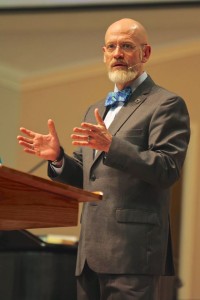 Article by Dr. James White (original source though one could properly question its fundamental truthfulness. It reflects, however, the prevailing attitude of Western culture, a pragmatism that enshrines in the judgment of “history” (whatever that means in this context) the final arbiter of morality, goodness, and worth. Often this phrase is being urged upon the church to “move on” from opposing homosexuality or the redefinition of marriage.
Article by Dr. James White (original source though one could properly question its fundamental truthfulness. It reflects, however, the prevailing attitude of Western culture, a pragmatism that enshrines in the judgment of “history” (whatever that means in this context) the final arbiter of morality, goodness, and worth. Often this phrase is being urged upon the church to “move on” from opposing homosexuality or the redefinition of marriage.
But this adage also captures the general attitude of a large portion of the population on both sides of the Tiber River to the Reformation and the continuing battle over the issues that gave it birth. Isn’t it time to just move on? Can’t we lay aside our differences for a greater good? Aren’t we a small enough minority now in the midst of a tsunami of secularism and the rising tide of Islam? Shouldn’t we be looking for unity, not for more reasons to remain separate?
We dare not dismiss the weight that these rhetorical questions carry with many within our congregations, and even among the clergy. At the same time, we must recognize the responsibility that is ours as heirs of the great struggle that was the Reformation. Can we betray those who came before us? What would such a betrayal involve? Are we really willing to assert that the great and momentous beliefs they fought for are no longer as important as we once thought?
The election of a new bishop of Rome in 2013 shed new light on the state of these questions in the minds of many who profess to be “evangelicals” and “biblical” in their faith and orientation. One well-known evangelical leader communicated with his followers electronically that we should be praying that God would “guide” the process of the selection of a new pope. In most venues, the objection that there is nothing remotely biblical about a “supreme pontiff” who is to be venerated as the “vicar of Christ on earth” or the “holy father” found little expression outside of those whose strongest feelings on the matter are borne of prejudice rather than conviction. And once the selection was made, many in the evangelical camp expressed pleasure at the selection, if for no other reason than Francis I has seemed significantly more, well, human—or at least less imperial—than Benedict XVI.
But very little of the public response was prompted by a passionate commitment to, say, the solas of the Reformation, or a knowledgeable, informed rejection of Rome’s soteriology over against a deep-seated love of the doctrine of justification by grace alone through faith alone.
Should the Reformation continue to hold a place of importance in the church that faces such immense opposition as that coming from radical, gospel-hating secularism? Wouldn’t a united front, free from partisan bickering, help the cause of Christ? The answer has to be, “Of course the Reformation remains important, and, in fact, its work must continue in our day, and into the future as well.”
The reason is not hard to see, even if it seems hidden to many in our day. Wonderfully nebulous catchphrases like “the cause of Christ” often hide the truth: the cause of Christ is the glorification of the triune God through the redemption of a particular people through the cross-work of Jesus Christ, which is a rather Puritan way of saying, “The cause of Christ is the gospel.” Each of the emphases of the Reformation, summed up in the solas, is focused upon protecting the integrity and identity of the gospel itself. Without the inspiration, authority, harmony, and sufficiency of Scripture, we do not know the gospel (sola Scriptura). Without the freedom of grace and the fullness of the provision of the work of Christ, we have no saving message (sola fide). And so on.
The Reformation fought a battle that each and every generation is called to fight simply because each and every generation is made up of the fallen sons and daughters of Adam, and hence there will always be those who seek to detract from the singular glory of God in the gospel through the addition of man’s authority, man’s merit, man’s sovereignty. Is this not the meaning of semper reformanda, the church always reforming, always seeking to hear more clearly, walk more closely, to her Lord?
With the ebb and flow of human history, the forces arrayed against the church and her Lord and the particular front upon which the battle rages hottest will change. Rome’s theology has evolved and her arguments have been modified, but the issues remain very much what they were when Luther and Eck battled at Leipzig, only modified and complicated. God’s kingship, man’s depravity and enslavement to sin, and the insatiable desire of sinners to control the grace of God will always be present. And today, the sufficiency, clarity, and authority of Scripture are at the forefront, just as they were then. The need for the Reformation will end when the church no longer faces foes inside and out who seek to distort her purpose, her mission, her message, and her authority. Till then, semper reformanda.

